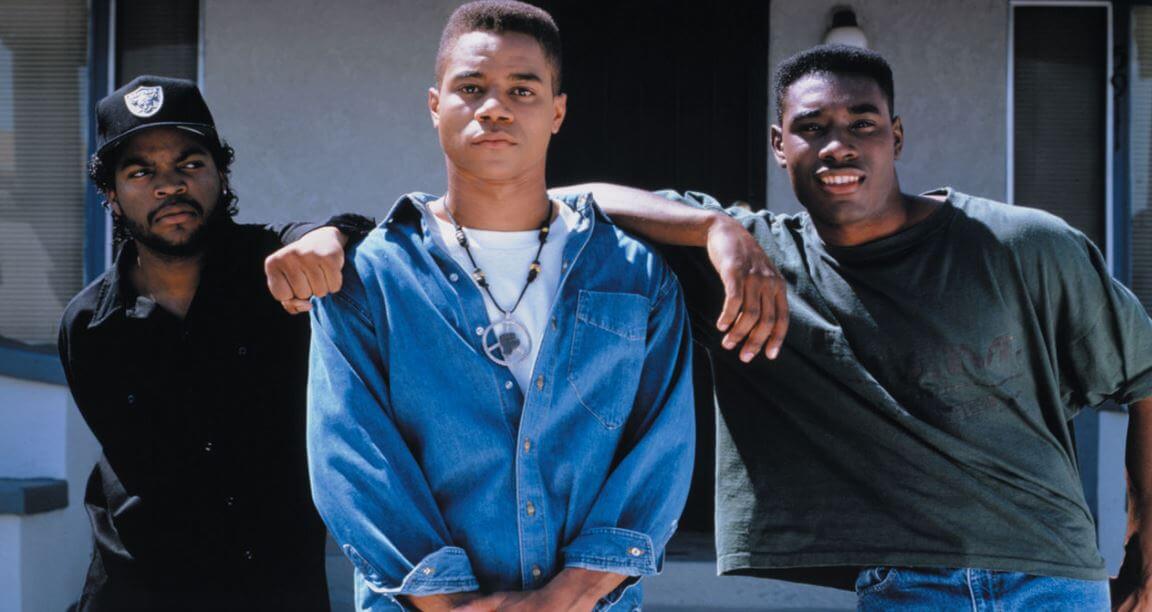
It is hard to believe that it is has been thirty years since the release of one of the most influential and consequential movies ever made. Boyz in the Hood captured audiences with its compelling imagery, captive storytelling, poignant social commentary, and just pure honesty and introduced the mainstream into a world they knew little to nothing about and a community that is usually abandoned and ignored.
The plot revolves around the lives of three young black men growing up in South Central Los Angeles at the height of the crack epidemic, mass incarceration, police brutality, gentrification, and rampant gang violence and when Hip Hop was the megaphone calling attention to these problems and those voices hollering into the megaphone were none other than the likes of NWA, Ice‑T, Cypress Hill, Public Enemy, and others.
Cuba Gooding Jr.’s character Tre learns some important life lessons about love, relationships, race, and manhood along the way and he goes through this very treacherous journey with his father Furious Styles played by Laurence Fishbourne, his best friend and high school football standout Ricky Baker played by Morris Chestnut, and his other good friend and member of the Crips Doughboy played by Ice Cube.
The coming of age tale did more than just entertain, it enlightened. It humanized the experiences of each of the characters that it was truly art imitating life.
The picture would garner critical acclaim and earned the legendary John Singleton an Oscar nomination for Best Director and launched the acting careers of Cube, Gooding, and Chestnut.
I had the chance to talk to veteran Hip Hop journalist and cultural critic Charlie R. Braxton to get his thoughts on the film’s significance all these years later and how it remains relevant to the present day.
Can you describe the impact of Boyz in the Hood?
The impact of Boyz in the Hood was tremendous. The thing that made that film so powerful was that it gave a very human perspective to life in South Central LA. It was the visual equivalent to NWA Straight Outta Compton.
How significant was it for a then up in coming director like John Singleton, who came from South Central La, to tell the story?
It was very important that director John Singleton was a native of South Central tell this story. Growing up there, he knew the story intimately, he knew the characters, and, most importantly, he had a profound love and understanding of South Central LA. That why he was able to humanize the characters in a way that the movie, Colors couldn’t. Too often Hollywood tells stories involving people of color from a very superficial level. This makes it easier for the largest Society to dehumanize people of color. Singleton was able to move beyond the superficial and get into the nuances of the people from South Central LA.
How would you fit Boyz in the Hood in the context of the present day with Black Lives Matter?
Well there are several ways to contextualize the movie Boyz in the Hood with the black lives matter movement. The most obvious is the one where the scene with the black cop who harassed the main character. Put on a deeper note the movie also talked about the social economic forces that render black lives meaningless to the larger society. When Furious Styles point out how liquor stores are on every corner in the black community because the largest Society once the black community 2 kill itself, he is explain the systematic genocide that takes place in the African American and Latino community. Today we can add to that food deserts, bad water, poor schools and inadequate medical facilities.
Latest posts by Zachary Draves (see all)
- MEGAN THEE STALLION RECEIVES MUCH NEEDED SUPPORT FROM THE SOUTHERN BLACK GIRLS & WOMEN’S CONSORTIUM — November 20, 2022
- HIP-HOP TAKES A STAND AGAINST THE OVERTURNING OF ROE V WADE — July 13, 2022
- REMEMBERING LISA LEFT EYE LOPES 20 YEARS LATER — April 25, 2022
